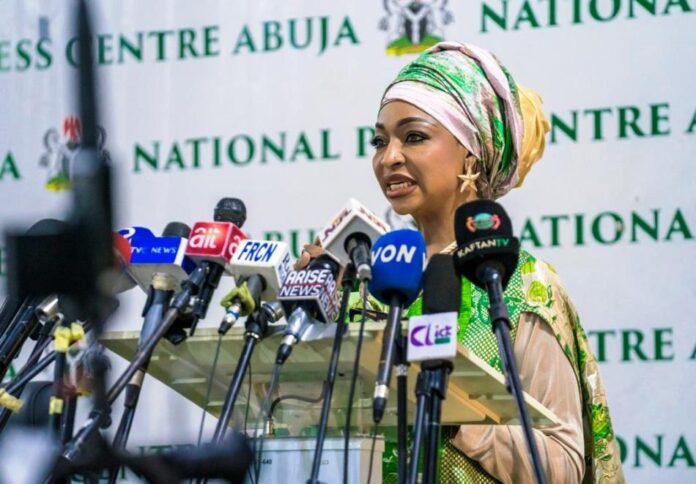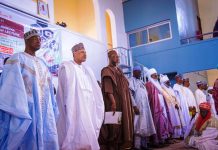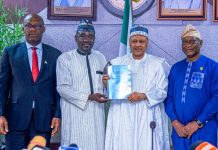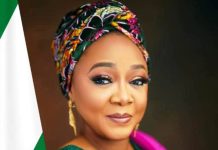PROTOCOL
INTRODUCTION:
It is with great honor and a profound sense of responsibility that I stand before you today to present the scorecard of the Federal Ministry of Arts, Culture, Tourism and the Creative Economy.
As earlier stated by the HM of Information and National Orientation, the purpose of this gathering is to acquaint the Nigerian public with the activities, achievements as well as the challenges facing the Ministry.
If we recall,His Excellency, President Bola Ahmed Tinubu in his drive to deliver on the Renewed Hope Agenda which includes amongst others reduction of government expenditure, streamline the activities of government to reposition to system for effective service delivery merged the then Federal Ministry of Tourism with the Ministry of Arts, Culture, and the Creative Economy thus establishing a new Ministry of Arts, Culture, Tourism and the Creative Economy on 23rd October, 2023.This merger aligns with the Administration’s vision of harnessing the synergies between the sectors for sustainable development, diversification of the economy, inclusive growth and global influence.
The Mandate of the Ministry is “to provide enabling environment for exposure of the positive elements of the nation’s Arts, Culture, Tourism and to harness the potentials of Nigeria’s creative economy.”
AGENCIES UNDER THE SUPERVISION OF THE MINISTRY:
To actualize the mandate of the Ministry, the Ministry through its Departments supervises 11 Agencies as follows:
(a) National Council for Arts & Culture (NCAC)
(b) National Institute of Cultural Orientation (NICO)
(c) Centre for Black and African Arts and Civilization (CBAAC)
(d) National Film and Video Censors Board (NFVCB)
(e) Nigerian Film Corporation (NFC)
(f) National Commission for Museums and Monuments (NCMM)
(g) National Gallery of Arts (NGA)
(h) National Theater (NT)
(i) National Troupe of Nigeria (NTN)
(j) Nigerian Tourism Development Authority (NTDA)
(k) Nigerian Institute of Hospitality & Tourism (NIHOTOUR)
Strategic Importance of the Ministry
Priority Area 7 of the Bola Ahmed Tinubu administration:
“Accelerate Diversification of the Economy Through Industrialization, Digitization, Creative Arts, Manufacturing & Innovation.”
Ladies & Gentlemen, the creative economy in Nigeria has long been a vibrant and resilient sector, that has thrived independently without adequate government’s support. With the establishment of this Ministry by the present administration, it is clear that a new era has dawned. The Ministry therefore operates as a catalyst for innovation, a driver of growth, and a champion for the empowerment of Nigeria’s extraordinarily diverse and talented cultural and creative sector.
The Ministry as part of its D30 data initiative, is conducting a mapping that will offer a data-informed foundation for target setting, investment prioritization, and programme design across Nigeria’s creative economy. This evidence-based approach is fundamental to our strategic planning and decision-making processes.
As an example, in the music sector, we have identified 5 segments in the value chain including Production, Marketing and Sales and based on our draft report, we project that we will create over 500,000 new jobs in the sector by 2030. Our mapping indicates that this sector will continue to thrive through self-employment and micro-enterprise pathways, with regional hubs like Edo, Delta, and Plateau playing key roles alongside Lagos. We are currently going through a validation process and should formally publish the mapping results in early June.
These figures are not merely statistics; they represent real opportunities for Nigerian youth, women, and communities across our nation. They demonstrate the transformative potential of our creative industries when properly supported and strategically developed.
A) Policy Review, Formulation and Implementation: Policy formulation is crucial for the development, growth and advancement of the 4 Sectors under the Ministry. At the inception of this Ministry, the policies regulating the sector were not only found to be inadequate but were outdated and failed to address the developmental changes in the arts, culture, tourism and the creative economy sectors.
Consequently, to reposition the sectors and provide an enabling environment for the sectors to thrive and attain its position as a major alternative to income generation for Nigeria, the Ministry in collaboration with the private sector lead by the Nigerian Economic Summit Group (NESG) is poised to provide a clear policy framework for not only the creative economy but the arts, culture and tourism sectors of Nigeria.
The policies undergoing review, formulation and implementation are:
i. National Policy on Intellectual Property Rights
ii. National Policy on Incentivizing the Art, Culture and Creative Economy
iii. The Review of the 2005 National Tourism Policy of Nigeria
iv. The Review of the 1988 National Policy on Culture of Nigeria
v. Policy on Monetary and Credit Solutions for the Creative Economy
vi. Development of a new National Policy on Creative Economy
• NFVCB Regulations 2024 transition from censorship-focused approach to a modern classification system, addressing concerns about glamorization of tobacco, narcotics, and ritual killings in films, music videos, and skits
• Federal Executive Council approval of the Creative Economy Development Fund (CEDF) and implementation of the IP Monetisation Pilot to provide funding to creatives and develop a model for IP asset securitization
• Federal Executive Council approval of the Creative Leap Acceleration Programme (CLAP), a digital platform to support creative enterprises with funding, creative technology, and co-working spaces
• Comprehensive film industry reform program including retooling of government agencies and parastatals, encouraging a functional, self-regulated ecosystem to improve welfare and working conditions, and strengthening intellectual property rights protection.
• Development of Creative Industry Administrators on Intellectual Property Rights Management, 2025 in collaboration with World Intellectual Property Organization (WIPO), Abuja Office.
B) Cultural Diplomacy: Soft Power
• Launch of Destination 2030: Nigeria Everywhere at the World Economic Forum in Davos, creating a unified “Brand Nigeria” identity that has improved Nigeria’s global soft power ranking by 14 points in just one year, rising from 93rd place in 2023 to 79th in 2024
• Motherland 2025 Initiative aimed at reconnecting Nigerians in the diaspora with their roots and positioning Nigeria as a global tourism hub
• Nigerian Film Corporation’s international engagements at prestigious events including Screen Nigeria at the 77th Festival De Cannes in France, Nigerian International Film & TV Summit in France, and other global forums, positioning Nigeria as Africa’s cinematic powerhouse
• Centre for Black and African Arts and Civilization (CBAAC) expansion of international cultural diplomacy efforts, including engagement with the Francophone Ambassadors’ Group for FESTAC’77 Golden Jubilee and participation in cultural exchange programs in Beijing
• National Council for Arts and Culture’s “Origins” platform development, which serves as a national repository of Nigeria’s living culture and has gained international recognition at the United Nations General Assembly in New York
• Securing two UNESCO inscriptions for the Sango Festival in Oyo and the Midwifery: Knowledge, Skills and Practices on the UNESCO’s Representative List of Intangible Cultural Heritage of Humanity
• Receiving UNESCO certificate for the Kano Durbar Festival, recognizing it as an Intangible Cultural Heritage of Humanity
• UNESCO Creative City Network (UCCN): The designation of Bida in Niger State as a City of Craft and Folk Art, and Asaba as a City of Film in the UNSCO Creative Cities Network (UCCN).
• Securing hosting rights for the 68th meeting of the UN Tourism Commission for Africa (CAF) to be held in Abuja from 11th-13th June 2025
• Organizing a cultural event at the United Nations General Assembly, UNGA to promote Nigeria’s cultural heritage globally
• Inscription of Historical Sites into Islamic World Educational, Scientific and Cultural Organization (ICESCO) Tangible & Intangible Heritage: The inscriptions of four (4) historical sites on both tentative and final lists of tangible and intangible heritage. They include:
(i) Gobirau Minaret, Katsina State.
(ii) Sheikh Alimi Mosque Complex Ilorin, Kwara State.
(iii) Mbormi Battle Ground, Gombe State and
(iv) Hubbaren Shehu, Sokoto State.
• Leading a delegation to the G20 Meeting for ministers of culture, representing the African Union
• Global Outreach Program with engagements in Europe, the Middle East, and Latin America to showcase Nigeria’s cultural diplomacy and creative excellence
• Showcasing Nigeria’s participation at the prestigious international art exhibition, the Venice Biennale
C) Economic Value & Investment Mobilization for the Tourism & Creative Economy Sector
• $200 million commitment from AFREXIM Bank to accelerate building of cultural and creative industries, to be operationalized by June 1, 2025
• Partnership with Ministry of Finance Incorporated (MOFI) to monetize tangible and intangible assets within creative and tourism domains by cataloging, valuing, and securitizing government assets
• Strategic collaboration with Federal Inland Revenue Service (FIRS) to enhance tax compliance and revenue collection while fostering growth of the creative economy
• Launch of the Creative Economy Development Fund (CEDF), a landmark initiative approved by the Federal Executive Council designed to catalyze growth, innovation, and sustainable financing for Nigeria’s creative and cultural industries through:
o A Debt Financing Window offering affordable loans to viable creative businesses
o An Equity/Quasi-Equity Window providing investments in promising creative businesses with high-growth potential
o A Grant Funding Window supporting innovative ideas and cultural projects with high impact potential
o The fund will benefit the entire creative economy value chain across sectors including film, music, fashion, art, publishing, gaming, cultural heritage, and tourism
• Renewed Hope Cultural Project’s economic impact, creating opportunities for rural communities to participate in wealth creation, boosting rural economies through job creation, and positioning rural businesses to tap into both national and international markets
• Collaboration with BigWin Philanthropy to create job opportunities in Nigeria’s creative sector, focusing on unlocking the demographic dividend
D) Job Creation
E) Infrastructure
• Establishment of the Creative & Tourism Infrastructure Corporation (CTICo), approved by the Federal Executive Council, with projected investment of $100 billion and potential to create over 2 million jobs
• Partnership with Creative Park Limited to establish Abuja Creative City, a first-of-its-kind creative hub in Africa on 26 hectares of land in the IDU Industrial Area, Abuja
• Establishment of the Nigerian Academy of Cultural Studies (NACUS) by the National Institute for Cultural Orientation (NICO), with four strategic campuses in Ogbomoso, Calabar, Lagos, and Abuja, offering specialized cultural education programs
• Launch of the D30 Data Platform, an open-source data initiative developed with BigWin Philanthropy to provide transparent, reliable, and actionable data for Nigeria’s cultural, tourism, and creative economy sectors.
• Creative Leap Acceleration Programme (CLAP) provides essential resources like funding, creative technology and co-working spaces and promotes innovation via innovation labs and project support.
• Renewed Hope Cultural Project’s infrastructure development, including restoration and conservation of historical sites, monuments, palaces, artifacts, and natural attractions, and the establishment of Renewed Hope Cultural Villages across all states of the federation including FCT
• Launch of a major initiative to renovate Nigeria’s national museums, preserving cultural heritage
• NCAC partnership with Mefa Abuja to develop six state-of-the-art performance venues across Nigeria
• Securing concessionary funding from the French Treasury for creative infrastructure projects in Nigeria, with potential funding expanded from €35 million to €100 million
• Partnership with IHS Nigeria and the National Commission for Museums and Monuments (NCMM) to digitize Nigeria’s cultural heritage, making historical artifacts and artworks accessible through a digital museum
E) Strategic Partnerships
• AFREXIM Bank partnership for $200 million funding commitment
• Collaboration with Ministry of Finance Incorporated (MOFI) for asset monetization through a formal Memorandum of Understanding and as anchor shareholder for the Creative Economy Development Fund
• Partnership with Federal Inland Revenue Service (FIRS) for tax framework development
• FMACTCE’s partnerships with State Governments, Traditional Institutions, Nigerian Universities, and PlayHouse Communications for the Origins platform
• Creative Park Limited partnership for Abuja Creativity City development
• BigWin Philanthropy partnership for the development of the D30 Data Platform
• Collaboration with National Bureau of Statistics to ensure integrity and relevance of data for the creative economy sector
• Renewed Hope Cultural Project partnership with State Governments, a collaborative initiative approved by the National Economic Council (NEC) to implement cultural preservation and development projects across all states of the federation, ensuring grassroots engagement and nationwide impact
• Nigeria Economic Summit Group – aprivate sector lead in policy development
• Collaboration with the French Treasury to secure expanded funding for creative infrastructure projects in Nigeria
• Partnership with IHS Nigeria and the National Commission for Museums and Monuments (NCMM) for digitizing Nigeria’s cultural heritage
• Establishing integrated partnerships with various organizations to drive growth and innovation in Nigeria’s creative economy and tourism sector like MTN, Labera, Chocolate City, WakaNow, Emirate Airlines
• Embassies of Foreign Governments and Institutions
Abu Dhabi, Qatar, Brazil, France
• Intergovernmental collaborations with MDAs
• Film Treaty with Brazil
F) Impact to the subsectors of the Tourism and Creative Economy
• Film Industry: Nigerian Film Corporation’s advancement of Audio-visual Co-Production Agreements with South Africa and France, while negotiating with Morocco, India, Brazil, Spain, Italy, UK, Namibia, and Kenya
• Host of the 68th UN Tourism Commission for Africa (CAF) Meeting – Nigeria is set to host the 68th meeting of the UN Tourism Commission for Africa in Abuja from June 11-13, 2025.
• National Film and Video Censors Board’s implementation of upgraded Magpie Classification Module to ensure efficiency in classification process for films, music videos, and dramatized skits
• Capacity-building workshops for Kannywood filmmakers, roundtable discussions with industry professionals, and masterclasses for university students
• Comprehensive film industry reform program including retooling of government agencies and parastatals, encouraging a functional, self-regulated ecosystem to improve welfare and working conditions, and strengthening intellectual property rights protection
• Renewed Hope Cultural Project’s capacity building initiatives in local craftmanship, empowering rural artisans, particularly women and youth, with vocational training in local crafts, fashion, and creative entrepreneurship
• Promotion and preservation of traditional music, instruments, and dance, highlighting their cultural significance and facilitating the transmission of traditional music knowledge and skills from older to younger generations
• Celebration of International Mother Tongue (Language) Day by promoting and recognizing mother tongues, advocating for their importance in preserving cultural traditions, customs, and identities
• Empowerment of youths and women through capacity building and skill acquisition training programs in crafts and arts, providing them with knowledge, skills, and opportunities to connect with peers and industry experts
• Keynote speaker at the CANEX WKND Summit, focusing on strengthening the fashion and textile ecosystem
G) CHALLENGES
Despite our progress, we face several challenges:
- Funding Constraints – Many creative projects face difficulties securing adequate funding and distribution.
- Global Competition – Our creative products must meet high international quality standards to compete globally.
- Tourism Infrastructure – While we have made progress with facilities like Ikogosi Warm Springs Resort, many tourism sites across the country still require significant investment and development.
- Extensive Market Fragmentation-
- Inadequate work tools
- Lack of utility vehicles
H) Conclusion
In line with the vision of President Bola Ahmed Tinubu, the Ministry of Arts, Culture, Tourism and the Creative Economy stands at the forefront of Nigeria’s economic diversification strategy, transforming what was once viewed as merely cultural expression into powerful engines of sustainable growth and job creation. In just eighteen months, we’ve secured $200 million in investment commitments, established innovative funding mechanisms like the Creative Economy Development Fund, creating infrastructure that will generate over 2 million jobs, and elevating Nigeria’s global cultural standing—all while encouraging rural communities, women, and youth to participate meaningfully in the creative economy. Our strategic partnerships spanning government agencies, international organizations, and private sector leaders have positioned Nigeria’s tourism and creative sectors not just as alternatives to oil dependency, but as vibrant, inclusive economic pillars capable of addressing our nation’s most pressing challenges.
Thank you for your attention and God bless the Federal Republic of Nigeria.






